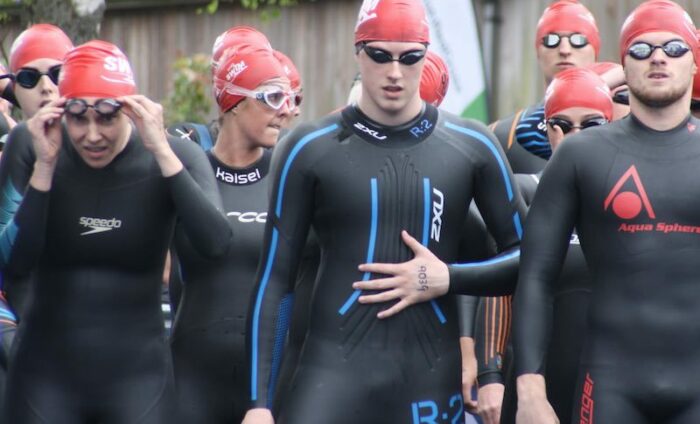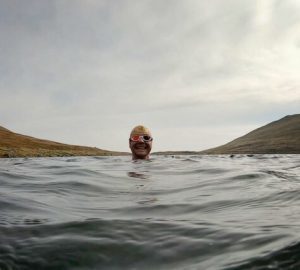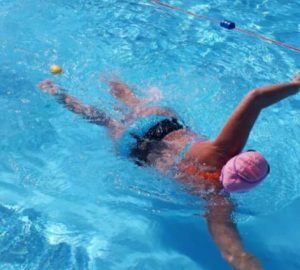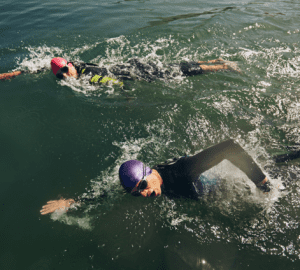
Sport psychology – take the pressure
Sport psychology is the study of how psychology influences sports, athletic performance, exercise and physical activity. Here we focus on controlling anxiety and coping with pressure – the art of thinking effectively
Open water swimming can be a source of anxiety for any athlete at any level; even the most confident swimmers can experience it. Most open water swimmers will talk about experiencing an array of physical feelings due to anxiety when entering a competition. These often include symptoms such as stomach butterflies, sweaty palms, tense muscles, nausea or restlessness. These physical symptoms are normal and are designed to help us out when responding to a pressure situation. A little dose of anxiety or pre-race nerves can be a good thing; it can sharpen our focus or give us adrenaline for that ‘extra edge’ in competition. Yet there is strong evidence that too much anxiety can impair performance.
Open water swimmers have a lot to contend with
From a physical and psychological perspective, open water swimming presents many unique challenges that can lead to anxiety. An inability to see in dark, murky water can be challenging for some, the technicality of sighting (which can potentially take you off course) is a difficult test and even the temperature can be problematic – it can be really cold! In addition, wetsuits can cause claustrophobia, be uncomfortable or restrictive for some swimmers and affect breathing. Open water swim starts can be intimidating with a mass of people, a scrum of flailing legs and attacking elbows. As open water swimmers, we have a lot to contend with and from a psychological perspective, this can be challenging. We are, however, all different and anxieties can differ according to the situation and the individual. Although some level of competition anxiety is considered to be normal, when competition anxiety exceeds a threshold level it can become detrimental to performance, motivation and enjoyment.
How can sport psychology help?
Anxiety has been a strong focus of interest in sport psychology for many years; primarily exploring the anxiety-performance relationship and the role competitive anxiety plays in sport. Models of stress have identified the central role of cognition and coping in the generation of emotions.
Evidence states that how you appraise a situation affects how you feel about it. In general, cognitive appraisal can be divided into two types of stages: primary and secondary appraisal. Primary appraisal is where you ask yourself the question, how significant or meaningful is this event for me? Secondary appraisal is where you assess your ability to cope with the situation.
Briefly, a primary appraisal focused on the potential threat a situation poses is generally associated with anxiety. Athletes who consistently experience anxiety, especially cognitive anxiety (which reflects worry and negative thoughts), frequently anticipate failure and negative social evaluation; additionally they tend to interpret these negative outcomes as significant threats to self-identity or self-esteem. Secondary appraisals involve those feelings related to the stressful event. Negative secondary appraisal might include statements such as ‘I can’t do it, I know I will fail.’
Sport psychology can help athletes with debilitating anxiety by teaching a variety of coping mechanisms. Remember, we are all different, so each athlete needs to work out which strategy works best for them. It may take a while to try out different things to work out which one is best for you.
Learning to cope – what strategy do you use?
Research suggests that there are two different ways of coping, by using problem-focused strategies or emotion-focused strategies. Briefly, problem-focused coping targets the causes of the stress in practical ways, such as identifying, solving and minimising effects; consequently directly reducing the stress. Emotion-focused coping involves trying to reduce negative emotional responses associated with the stress, such as anxiety. Avoidance coping is a third dimension of coping, which can be considered a type of emotion-focused coping. This dimension represents actions whereby individuals disengage themselves from the task at hand, making efforts to escape, avoid or distract themselves from the situation.
Sport related research on coping demonstrates that in general athletes employ a wide range of problem-focused, emotion-focused and avoidance coping strategies. Broadly, investigations between coping style and anxiety have shown that athletes who report more emotion-focused and avoidance coping tend to experience greater cognitive anxiety.
Identify negatives, doubts or worries
The first step to helping yourself with sport related anxiety is to identify the negatives, doubts or worries you may have about open water swimming. Are any types of negative thinking listed below contributing to your anxiety?
1. Don’ts Does the language that you use to talk to yourself include words that end with ‘n’ts’, such as ‘shouldn’t’, ‘wouldn’t’, ‘mustn’t’ or ‘didn’t’? Examples of this are saying things such as, “I shouldn’t tense up at the start of the race”; “don’t set off too quickly!” or “I mustn’t get panicked at the start.” Here you are focusing on what not to do, rather than what you can do!
2. Limitations These are barriers, which are self-imposed about future performance, expressed as statements often preceded with ‘can’t’, ‘never’ or ‘doubt’. Examples of this are saying things such as, “I can’t hope to get a personal best today”; “I’ve never swum well in really cold water”; “I doubt I will have a good race today in these conditions”. Limitations such as these fail to challenge what is possible for you.
3. Put downs These are statements relating to the athlete’s perceived weaknesses or errors in a previous performance, for example, “my technique was poor”; ”I went out too fast”; or “I was so slow in that race!” Put downs can begin to dominate thinking, overshadowing the positives.
4. What-ifs These describe a negative loop; the ‘worry’ is phrased in terms of a rhetorical question. The question is repeatedly posed, eg, “what if I swim badly today?”; “What if I let down my family who have come to watch me?” or “What if I get hit in the mass start?”
5. Self doubt These are expressions of doubt about having the ability to perform well. They may reflect a concern over physical readiness, technical ability or psychological preparedness, eg, “I’m not as fit as I should be”; “ I’m not breathing correctly”; “I can’t do this, it’s too cold and dark in the water.”
6. Letting others down This is a concern about how other people might be perceived to have judged your performance, eg, “Others will be disappointed in me”; “I’ve let myself down by swimming so badly”; “I’ve let my coach down”.
7. Preoccupations This refers to non-related problems, such as domestic issues, relationships and employment, which can distract the athletes thinking, affecting their performance.
If you recognise some of these negatives, thoughts or worries, it could be affecting you in a variety of different ways. Consequences can range from a lack of focus due to attending to errors to becoming very tense, or from trying to please others to a lack of confidence. It can affect you in many different ways. Read on to find out ways of reducing this type of negative thinking and learn to replace with clearer, more positive thinking.
Develop ways of thinking effectively
Here are some tips to help you develop ways to think more effectively and reduce anxiety-provoking thoughts.
DON’TS – Re-phrase
Instead of focusing on what not to do, focus on what you can do. For example, instead of thinking ‘don’t set off too quickly’ tell yourself to ‘start off steadily’.
LIMITATIONS – Believe in the possible
The aim of this is to perceive the performance as a challenge, rather than a threat. This focuses on thinking what is required in order to produce the desired performance. Also, try and keep a sense of proportion by keeping the outcome in perspective.
PUT DOWNS – See it as unstable
It is important to develop a view that putdowns are not permanent, weaknesses can be improved upon and recent lapses in form are unstable. Once you have identified a put-down, commit it to the past -“my technique was rubbish”, rather than “my technique is rubbish”, try and perceive future improvements, “there’s room for improvement in my starts next time”. Imagine if someone else spoke to you in the way that you speak to yourself; would you be as accepting of him or her putting you down in the same way?
WHAT IFS – So?
Prefixing the ‘what if’ question with ‘so, if..’ encourages a response again based on what you can do to enhance your performance. For example, the anxiety laden statement “what if I get hit at the start of my open water race?” becomes a problem-solving statement such as, “so, if I get hit at the start… I will move to the side, take three deep breaths and then carry on”.
SELF DOUBTS – Flip it over
Some aspects of self doubt and performance may be framed in negative ways, yet it is always possible to shed a more positive light on the experience, for example, “I am not the slowest swimmer in the world, it just so happens there are a lot of people who are quicker than me.”
LET OTHERS DOWN – Be your own judge
It is important to remember if you have concern over how you might be judged or evaluated by others that firstly it is impossible to control the way others think, they will make their own minds up and secondly people will make judgements irrespective of how you perform as a swimmer – however good you are, someone, somewhere will be critical. The way people judge you is their concern, not yours. You are the only one who has the inside knowledge to judge you and therefore that should count.
PREOCCUPATIONS – Bag it
This is a way of putting potential distractions on hold. Pre-competition is not a great time to be resolving problems, when your focus should be on preparation and performance. Aim to sideline your problem until after the competition – put a ring around it visually and decide to analyse it and problem solve it after the competition.
Helen Davis is a sport psychology consultant who works with individuals, teams and coaches on all aspects of sporting performance. Helen has a BA (Hons) in Psychology, an MSc in Sport and Exercise Psychology and is currently working towards chartered status with the British Psychological Society. She is also an active masters and open water swimmer.
Find out more: thinkbelieveperform.co.uk. Follow Helen on Twitter @helenDav22453







